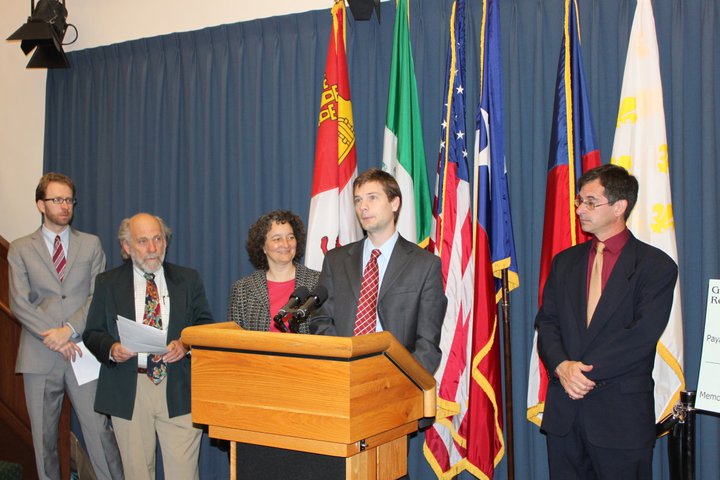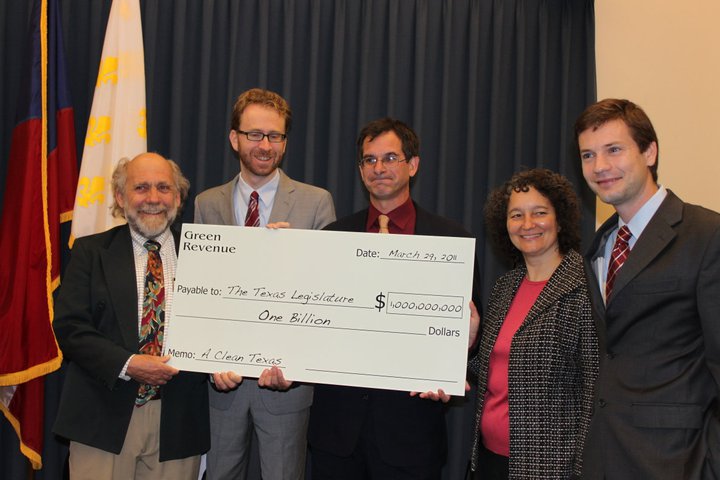While Texas Legislators are furiously looking under every couch cushion to find more revenue this bienium, the Alliance for Clean Texas today highlighted a half dozen strategies that could help Texas close its $27 billion budget deficit.

Alliance for Clean Texas Members (l to r) Luke Metzger, Environment Texas; Tom "Smitty" Smith, Public Citizen Texas; Robin Schnieder, Texas Campaign for the Environment; David Weinberg, Texas League of Conservation Voters; Cyrus Reed, Lone Star Chapter Sierra Club - photo courtesy TLCV
As lawmakers are loathe to talk about the dreaded “T” word (tax), groups like Public Citizen, Sierra Club, Texas Impact, Texas Campaign for the Environment, and Texas League of Conservation Voters, who sponsored this morning’s press conference, are offered alternative solutions to cutting needed education and health care services by raising $1 billion in revenue, while also protecting the environment.
These ideas include a severance tax, like oil and gas currently pay, for coal mined in the state and an import duty from out of state coal. Imported coal creates zero Texas jobs and pollutes the environment. If we’re going to ask oil and gas to pay a severance tax, we ought to ask coal to do the same.
Other ideas include making polluters pay the value they get from breaking clean air and water laws (ie, if by polluting you increase your profit by $15 million, you pay $15 million in fines), a surcharge on inefficient gas guzzlers and heavily polluting vehicles, and a recycling refund on bottles and cans (just clap your hands, just clap your hands!).
Cutting pollution would also mean fewer sick kids, fewer sick people in general. Children and the elderly are most at risk for pollution-caused or -aggravated disease AND they are the most likely to receive assistance from government health care services, so cutting pollution will save the state untold millions, if not billions. AND, since sick children are less likely to attend and be successful in school, cutting pollution also improves the quality of our schools– a triple value for our pollution-cutting dollar!
Combine this with former Lt. Governor Hobby calling on the state to end the tax credit on high-cost drilling operations (read: fracking) valued at $7.4 billion between 2004 and 2009. We had previously pointed out the hypocrisy of making the oil and gas industry’s culture of corporate welfare the only sacred cow in the budget due to their protected status resulting from all their campaign contributions.
Well, between the billions from the fracking exemption, the billion of Green revenue the ACT coalition mentioned… as they say in Washington, “A billion here, a billion there– pretty soon you’re talking about real money.”
State lawmakers who are serious about balancing the budget without brutalizing our schools, nursing homes, and hospitals ought to look carefully at these proposals and implement them. Even in the coldest, darkest winter, a farmer cannot start eating his own seed, as it will impact his ability to plant in the spring. Cutting necessary services to the bone and then sucking out the marrow will leave Texas cupboards bare, both literally and figuratively, as we struggle out of this recession.
The answer is simple- cut pollution, not teachers, doctors, and nursing home beds. Don’t let big polluters get their way, forcing grandma out onto the street and your kids into overcrowded classrooms.
The Texas House will be taking up HB 1, the budget, this Friday, and debate is expected to last all day and into the night. Texas Impact, one of our colleagues in ACT, along with several other groups are organizing a vigil for Texas’ future during the debate. RSVP on Facebook and we’ll see you there!
Look! A press release! From today’s press conference!
$1 BILLION GREEN DOLLARS FOR TEXAS: LEADING ENVIRONMENTAL ADVOCATES PRESENT WORKABLE SOLUTIONS TO HELP BRIDGE STATE’S BUDGET GAP
AUSTIN, TX—The Alliance for a Clean Texas outlined $1 billion in “green revenue” that could be available to state lawmakers as they work to craft a budget that bridges a $27 billion shortfall for the next biennium.
“Green revenue sources could generate at least $1 billion in general revenue for the state’s budget,” said David Weinberg, Executive Director of the Texas League of Conservation Voters and ACT Executive Committee member. “We have an opportunity to help balance the budget, limit draconian cuts to essential state services and improve our environment. That’s a combination we feel is worthy of lawmakers’ consideration.”
As the Senate Finance Sub-Committee on Fiscal Matters works to find additional savings and state revenue, ACT and its statewide allies outlined several proposals that make up $1 billion green revenue for the state:
1) Generating revenue from coal could raise $475 million for Texas for the biennium. Placing a fee on coal imported to Texas would generate about $190 million in revenue per year for the state. Placing a severance tax on coal mined in Texas would raise an additional $48 million per year. Currently, Texas taxes domestically drilled oil and gas. Placing a fee on coal could help the state offset the adverse public health impacts from coal generating power. State Representative Lon Burnam has filed HB 335, which would place a fee on imported coal.
2) Creating a Recycling Refund for Beverage Containers in Texas could generate an estimated $350 million for the biennium. Placing a refundable deposit on beverage containers would increase recycling and decrease litter. Unclaimed bottle deposits could generate revenue for the state, money that could be used to fund waste prevention and reduction programs. Such a program would also create thousands of recycling and reuse jobs in Texas. State Senator Rodney Ellis has filed SB 1119 and State Representative Garnett Coleman has filed HB 2114, which would create a refundable bottle deposit program in Texas.
3) Placing a surcharge on inefficient vehicles could generate $115 million for Texas for the biennium. Fuel-inefficient vehicles pollute our urban air, increasing rates of ozone and asthma, and increase our dependence on foreign oil. The Legislative Budget Board has recommended a $100 surcharge on fuel-inefficient vehicles as a way of generating revenue for Texas. State Representative Lon Burnam has filed HB 3067, which would create a surcharge on fuel-inefficient vehicles in Texas.
4) Strengthening clean-air rules at the Texas Commission on Environmental Quality to ensure that polluters pay could generate $56 million in revenue for Texas for the biennium. Raising the maximum per-day penalty for air quality violations to $25,000 per day could raise an estimated $40 million for the biennium, while requiring the agency to recover the economic benefit of non-compliance that polluters gain would add additional revenue to these totals. All of these funds go to General Revenue and can be used for schools. Removing the 4,000 tons per day cap on emissions could raise an additional $16 million for the biennium. These measures would create an incentive for industry to reduce pollution, and this revenue could be used to fund clean-air programs. State Senator Joan Huffman has filed SB 657 and State Representative Wayne Smith has filed HB 2694 to strengthen air-pollution rules in Texas though neither bill addresses the 4,000-ton cap as had been recommended by the Sunset Advisory Commission.
“We import 60 million tons of dirty coal per year for electrical power generation, sending $19 billion of our hard earned dollars out of state when that money could be better spent developing clean energy jobs in Texas. Coal is a fuel source that’s both harmful to the environment, detrimental to public health and doesn’t contribute a dime to the state in the form of severance taxes,” said Tom “Smitty” Smith, of Public Citizen “By imposing a coal import fee and a severance tax, we could generate $475 million.
“The majority of Texans support a recycling refund on cans and bottles because the financial incentive for recycling would clean up our communities, save on pollution control costs and have money left over to meet other pressing needs of the state,” said Robin Schneider of Texas Campaign for the Environment.
“Dirty gas guzzling cars and trucks not only pump out unnecessary pollution that costs us our health, they also exacerbate our dependence on oil,” said Luke Metzger, Director of Environment Texas. “A fee on these vehicles could help fund clean air programs and provide incentives for Texans to purchase fuel efficient cars and trucks.”
“Giving our state environmental agency the ability to charge fines more in line with major pollution events and charge an emissions fee for those spewing out more than 4,000 tons of a pollutant couldn’t come at a better time for Texas,” noted Cyrus Reed, Conservation Director with the Lone Star Chapter of the Sierra Club. ”Making sure those businesses that break the law pay for any economic benefit they gain will provide a financial disincentive for companies that pollute our air and poison our water, and reward good behavior for those that play by the rules.”
Cutting Pollution-Related Health Care Costs Would Save GR
In addition to generating new “green” revenue, advocates said the state could save more than $320 million in general revenue spending on health care by reducing air pollution. Texas Impact released an analysis of air pollution-related costs in Medicaid, CHIP and the state employee health insurance program showing that Texas currently spends $300 million per biennium on the state’s share of Medicaid and CHIP costs for air pollution-related diseases and conditions, and $23 million per biennium for the same costs in the state employee health insurance system. Altogether, the three programs are estimated to account for $1.9 billion in general revenue spending over five years.
“Medicaid is the most important budget driver after public education, and we simply can’t afford to be creating extra health cost burdens,” said Bee Moorhead of Texas Impact. “Clearing the air for all Texans not only would reduce unnecessary suffering—it would save taxpayers money as well.”
ACT was joined by representatives from the Texas League of Conservation Voters, Public Citizen, Texas Campaign for the Environment, Environment Texas, the Lone Star Chapter of the Sierra Club, and Texas Impact to urge lawmakers to look for greener, cleaner ways to generate revenue. The green revenue could lessen the cuts that the Legislature is pondering for public education, higher education and health care.
###
By promoting cleaner energy, cleaner government, and cleaner air for all Texans, we hope to provide for a healthy place to live and prosper. We are Public Citizen Texas.



